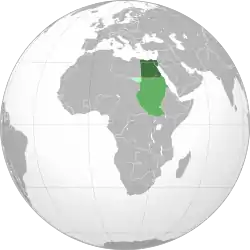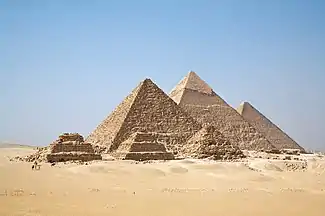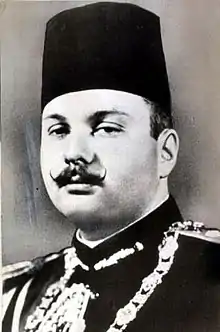Kingdom of Egypt
The Kingdom of Egypt (Arabic: المملكة المصرية, romanized: Al-Mamlaka Al-Miṣreyya, lit. The Egyptian Kingdom) was the Egyptian state established under the Muhammad Ali dynasty in 1922 following the Unilateral Declaration of Egyptian Independence by the United Kingdom. Until the Anglo-Egyptian treaty of 1936, the Kingdom was only nominally independent, since the British retained control of foreign relations, communications, the military and the Anglo-Egyptian Sudan. Between 1936 and 1952, the British continued to maintain military presence and political advisers, at a reduced level.
Kingdom of Egypt | |||||||||||
|---|---|---|---|---|---|---|---|---|---|---|---|
| 1922–1953 | |||||||||||
 Green: Kingdom of Egypt Lighter green: Anglo-Egyptian Sudan condominium Lightest green: Ceded from the Sudan to Italian North Africa in 1919. | |||||||||||
| Capital | Cairo | ||||||||||
| Common languages | Arabic (official)[1] Egyptian Arabic | ||||||||||
| Religion | Islam | ||||||||||
| Demonym(s) | Egyptian | ||||||||||
| Government | Unitary parliamentary constitutional monarchy | ||||||||||
| King | |||||||||||
• 1922–1936 | Fuad I | ||||||||||
• 1936–1952 | Farouk I | ||||||||||
• 1952–1953 | Fuad II a | ||||||||||
| British High Commissioner | |||||||||||
• 1922–1925 | Edmund Allenby | ||||||||||
• 1925–1929 | George Lloyd | ||||||||||
• 1929–1933 | Percy Loraine | ||||||||||
• 1933–1936 | Miles Lampson | ||||||||||
| Prime Minister | |||||||||||
• 1922 (first) | Abdel Khaliq Sarwat Pasha | ||||||||||
• 1952–1953 (last) | Muhammad Naguibb | ||||||||||
| Legislature | Parliament | ||||||||||
| Senate | |||||||||||
| Chamber of Deputies | |||||||||||
| Historical era | Interwar era / World War II / Cold War / Palestine War | ||||||||||
| 28 February 1922 | |||||||||||
| 15 March 1922 | |||||||||||
| 19 April 1923 | |||||||||||
27 August 1936 | |||||||||||
| 24 October 1945 | |||||||||||
| 1948–49 (May–March) | |||||||||||
| 23 July 1952 | |||||||||||
• Republic proclaimed | 18 June 1953 | ||||||||||
| Area | |||||||||||
| 1937 census | 3,418,400 km2 (1,319,900 sq mi) | ||||||||||
| Population | |||||||||||
• 1927 census | 14,218,000 | ||||||||||
• 1937 census | 15,933,000 | ||||||||||
• 1947 census | 19,090,447 | ||||||||||
| Currency | Egyptian pound | ||||||||||
| ISO 3166 code | EG | ||||||||||
| |||||||||||
| Today part of | |||||||||||
| |||||||||||
Part of a series on the |
||||||||||||||||||
|---|---|---|---|---|---|---|---|---|---|---|---|---|---|---|---|---|---|---|
| History of Egypt | ||||||||||||||||||
 | ||||||||||||||||||
|
||||||||||||||||||
|
||||||||||||||||||
|
||||||||||||||||||
|
||||||||||||||||||
|
||||||||||||||||||
|
||||||||||||||||||
|
| ||||||||||||||||||
The legal status of Egypt had been highly convoluted, due to its de facto breakaway from the Ottoman Empire in 1805, its occupation by Britain in 1882, and its transformation into a sultanate and British protectorate in 1914. In line with the change in status from sultanate to kingdom, the Sultan of Egypt, Fuad I, saw his title changed to King of Egypt. Throughout the kingdom's existence, the Sudan was formally united with Egypt. However, actual Egyptian authority in the Sudan was largely nominal due to Britain's role as the dominant power in the Anglo-Egyptian Sudan.
During the reign of King Fuad, the monarchy struggled with the Wafd Party, a broadly based nationalist political organization strongly opposed to British influence in Egypt, and with the British themselves, who were determined to maintain their control over the Suez Canal. Other political forces emerging in this period included the Communist Party (1925), and the Muslim Brotherhood (1928), which eventually became a potent political and religious force.
King Fuad died in 1936 and Farouk inherited the throne at the age of sixteen. Alarmed by the Kingdom of Italy's recent invasion of Abyssinia, he signed the Anglo-Egyptian Treaty, requiring Britain to withdraw all troops from Egypt, except in the Suez Canal Zone (agreed to be evacuated by 1949). The kingdom was plagued by corruption, and its citizens saw it as a puppet of the British. This, coupled with the defeat in the 1948–1949 1948 Arab-Israeli War, led to the Egyptian coup of 1952 by the Free Officers Movement. Farouk abdicated in favour of his infant son Fuad II. In 1953 the monarchy was formally abolished and the Republic of Egypt was established. The legal status of Sudan was only resolved in 1954, when Egypt and Britain agreed that it should be granted independence in 1956.
Sultanate and Kingdom
In 1914, Khedive Abbas II sided with the Ottoman Empire and the Central Powers in the First World War, and was promptly deposed by the British in favour of his uncle Hussein Kamel. Ottoman sovereignty over Egypt, which had been hardly more than a legal fiction since 1805, now was officially terminated. Hussein Kamel was declared Sultan of Egypt, and the country became a British protectorate.
Aftermath of World War I
A group known as the Wafd (meaning "Delegation") attended the Paris Peace Conference of 1919 to demand Egypt's independence. Included in the group was political leader, Saad Zaghlul, who would later become Prime Minister. When the group was arrested and deported to the island of Malta, demonstrations started to occur in Egypt.
From March to April 1919, there were mass demonstrations that turned into uprisings. These are known in Egypt as the First Revolution. In November 1919, the Milner Commission was sent to Egypt by the British to attempt to resolve the situation. In 1920, Lord Milner submitted his report to Lord Curzon, the British Foreign Secretary, recommending that the protectorate should be replaced by a treaty of alliance.
As a result, Curzon agreed to receive an Egyptian mission headed by Zaghlul and Adli Pasha to discuss the proposals. The mission arrived in London in June 1920 and the agreement was concluded in August 1920. In February 1921, the British Parliament approved the agreement and Egypt was asked to send another mission to London with full powers to conclude a definitive treaty. Adli Pasha led this mission, which arrived in June 1921. However, the Dominion delegates at the 1921 Imperial Conference had stressed the importance of maintaining control over the Suez Canal Zone and Curzon could not persuade his Cabinet colleagues to agree to any terms that Adli Pasha was prepared to accept. The mission returned to Egypt in disgust.
In December 1921, the British authorities in Cairo imposed martial law and once again deported Zaghlul. Demonstrations again led to violence. In deference to the growing nationalism and at the suggestion of the High Commissioner, Lord Allenby, the UK recognized Egyptian independence in 1922, abolishing the protectorate, and converting the Sultanate of Egypt into the Kingdom of Egypt. Sarwat Pasha became prime minister. British influence, however, continued to dominate Egypt's political life and fostered fiscal, administrative, and governmental reforms. Britain retained control of the Canal Zone, Sudan and Egypt's external protection, the police, army, the railways and communications, the protection of foreign interests, minorities and the Sudan pending a final agreement.
Representing the Wafd Party, Zaghlul was elected Prime Minister in 1924. He demanded that Britain recognize the Egyptian sovereignty in Sudan and the unity of the Nile Valley. On November 19, 1924, the British Governor-General of Sudan, Sir Lee Stack, was assassinated in Cairo and pro-Egyptian riots broke out in Sudan. The British demanded that Egypt pay an apology fee and withdraw troops from Sudan. Zaghlul agreed to the first but not the second and resigned.[4]
Recognition

With nationalist sentiment rising, Britain formally recognized Egyptian independence in 1922, and Hussein Kamel's successor, Sultan Fuad I, substituted the title of King for Sultan.[5] However, the British influence in Egyptian affairs persisted. Of particular concern to Egypt was Britain's continual efforts to divest Egypt of all control in Sudan. To both the King and the nationalist movement, this was intolerable, and the Egyptian Government made a point of stressing that Fuad and his son King Farouk I were "King of Egypt and Sudan".[6]
World War II
Britain used Egypt as a base for Allied operations throughout the region, especially the battles in North Africa against Italy and Germany. Its highest priorities were control of the Eastern Mediterranean, especially keeping the Suez Canal open for merchant ships and for military connections with India and Australia.[7]
The government of Egypt, and the Egyptian population, played a minor role in the Second World War. When the war began in September 1939, Egypt declared martial law and broke off diplomatic relations with Germany. It did not declare war on Germany, but the Prime Minister associated Egypt with the British war effort. It broke off diplomatic relations with Italy in 1940, but never declared war, even when the Italian army invaded Egypt. King Farouk practically took a neutral position, which accorded with elite opinion among the Egyptians. The Egyptian army did no fighting. It was apathetic about the war, with the leading officers looking on the British as occupiers and sometimes holding some private sympathies toward the Axis.[8] In June 1940, the King dismissed Prime Minister Aly Maher, who got on poorly with the British. A new coalition government was formed with the Independent Hassan Pasha Sabri as Prime Minister.[9]
Following a ministerial crisis in February 1942, the ambassador Sir Miles Lampson, pressed Farouk to have a Wafd or Wafd-coalition government replace Hussein Sirri Pasha's government. On the night of 4 February 1942, British troops and tanks surrounded Abdeen Palace in Cairo and Lampson presented Farouk with an ultimatum. Farouk capitulated, Nahhas formed a government shortly thereafter. However, the humiliation meted out to Farouk, and the actions of the Wafd in cooperating with the British and taking power, lost support for both the British and the Wafd among both civilians and, more importantly, the Egyptian military.[10]
Post War Period
Most British troops were withdrawn to the Suez Canal area in 1947 (although the British army maintained a military base in the area), but nationalist and anti-British sentiment continued to grow after the War. Anti-monarchy sentiments further increased following the disastrous performance of the Kingdom in the First Arab-Israeli War. The 1950 election saw a landslide victory of the nationalist Wafd Party and the King was forced to appoint Mostafa El-Nahas as the new Prime Minister. In 1951 Egypt unilaterally withdrew from the Anglo-Egyptian Treaty of 1936 and ordered all remaining British troops to leave the Suez Canal.
As the British refused to leave their base around the Suez Canal, the Egyptian government cut off the water and refused to allow food into the Suez Canal base, announced a boycott of British goods, forbade Egyptian workers from entering the base and sponsored guerrilla attacks. The situation turned the area around the Suez Canal into a low level war zone. On 24 January 1952, Egyptian guerrillas staged an attack on the British forces around the Suez Canal, during which the Egyptian Auxiliary Police were observed helping the guerrillas. In response, on 25 January, General George Erskine sent British tanks and infantry to surround the auxiliary police station in Ismailia and gave the policemen an hour to surrender their arms in the grounds. The police were arming the guerrillas. The police commander called the Interior Minister, Fouad Serageddin, Nahas's right-hand man, who was smoking cigars in his bath at the time, to ask if he should surrender or fight. Serageddin ordered the police to fight "to the last man and the last bullet". The resulting battle saw the police station levelled and 43 Egyptian policemen killed together with 3 British soldiers. The Ismailia incident outraged Egypt. The next day, 26 January 1952, was "Black Saturday", as the anti-British riot was known. It saw much of downtown Cairo which the Khedive Ismail the Magnificent had rebuilt in the style of Paris, burned down. Farouk blamed the Wafd for the Black Saturday riot, and dismissed Nahas as prime minister the next day and replaced by Aly Maher Pasha.
Dissolution
On July 22 – July 23, 1952, the Free Officers Movement, led by Muhammad Naguib and Gamal Abdel Nasser, launched a coup d'état (Egyptian Revolution of 1952) against the king. Farouk I abdicated the throne to his son Fouad II, who was, at the time, a seven months old baby; the Royal Family left Egypt some days later and Council of Regency, led by Prince Muhammad Abdel Moneim was formed.
The Council, however, held only nominal authority and the real power was actually into the hands of the Revolutionary Command Council, led by Naguib and Nasser.
Popular expectations for immediate reforms led to the workers' riots in Kafr Dawar on 12 August 1952, which resulted in two death sentences. Following a brief experiment with civilian rule, the Free Officers abrogated the monarchy and the 1923 constitution and declared Egypt a republic on 18 June 1953. Naguib was proclaimed as President, while Nasser was appointed as new Prime Minister.
References
- Article 149 of the 1923 Constitution.
- Bonné, Alfred (2003) [First published 1945]. The Economic Development of the Middle East: An Outline of Planned Reconstruction after the War. The International Library of Sociology. London: Routledge. p. 24. ISBN 978-0-415-17525-8. OCLC 39915162. Retrieved 2010-07-09.
- Shousha, Aly Tewfik (1947). "Cholera Epidemic in Egypt: A Preliminary Report". Bull. World Health Organ. National Center for Biotechnology Information. 1 (2): 371. PMC 2553924. PMID 20603928.
- Michael T. Thornhill, "Informal Empire, Independent Egypt and the Accession of King Farouk." Journal of Imperial and Commonwealth History 38#2 (2010): 279-302.
- Michael T. Thornhill, "Informal Empire, Independent Egypt and the Accession of King Farouk." Journal of Imperial and Commonwealth History 38#2 (2010): 279-302.
- Michael T. Thornhill, "Informal Empire, Independent Egypt and the Accession of King Farouk." Journal of Imperial and Commonwealth History 38#2 (2010): 279-302.
- Steve Morewood, The British Defence of Egypt, 1935-40: Conflict and Crisis in the Eastern Mediterranean (2008).
- S. K. Rothwell, "Military Ally or Liability? The Egyptian Army 1936–1942." Army Quarterly & Defence Review 128#2 (1998): 180-7.
- John Marlowe, A History of Modern Egypt and Anglo-Egyptian Relations, 1800-1953 (1954) pp. 313–15.
- Marlowe, A History of Modern Egypt and Anglo-Egyptian Relations, 1800-1953 (1954) pp. 315–19.
Further reading
| Wikimedia Commons has media related to Kingdom of Egypt. |
- Daly, M.W. The Cambridge History Of Egypt Volume 2 Modern Egypt, from 1517 to the end of the twentieth century (1998) online
- Botman, Selma. "The liberal age, 1923–1952." in M.W. Daly, ed. The Cambridge History of Egypt, Vol. 2: Modern Egypt, from 1517 to the End of the Twentieth Century (2008), pp 285–308.
- Goldschmidt Jr., Arthur. Biographical Dictionary of Modern Egypt (1999).
- Karakoç, Ulaş. "Industrial growth in interwar Egypt: first estimate, new insights" European Review of Economic History (2018) 22#1 53–72, online
- Marlowe, John. A History of Modern Egypt and Anglo-Egyptian Relations, 1800-1953 (1954).
- Morewood, Steve. The British Defence of Egypt, 1935-40: Conflict and Crisis in the Eastern Mediterranean (2008).
- Rothwell, S. K. "Military Ally or Liability? The Egyptian Army 1936–1942." Army Quarterly & Defence Review 128#2 (1998): 180-7.
- Royal Institute of International Affairs. Great Britain and Egypt, 1914-1951 (2nd ed. 1952) online at Questia; also online free
- Thornhill, Michael T. "Informal Empire, Independent Egypt and the Accession of King Farouk." Journal of Imperial and Commonwealth History 38#2 (2010): 279-302.
- Tignore, Robert L. Egypt: A Short History (2011) online
.svg.png.webp)
.svg.png.webp)